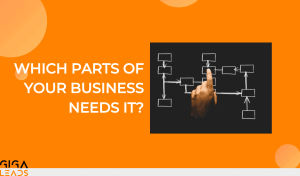Everything you need to know about a CRM system and why it is essential to any business.
What is a CRM system?
A CRM is a system where you can easily establish and maintain consumer relationships. It is an abbreviation for Customer Relationship Management. A customer relationship management system (CRM) helps companies manage their information with consumers and future customers. It can be used to track and record customer activity. This helps a business give personalized and comparable experiences for its customers. The best thing is, the way of communication doesn’t change even if the customer is already talking to another person.
It makes the tasks of organizations simplified. Also, it helps on improving productivity and builds partnerships – that’s why marketing teams and sales depend on CRM.
A CRM’s ultimate goal is to deliver a memorable customer experience and handle the growth of a business. Also, it wants to improve profitability and boost customer loyalty.
What is the meaning of CRM system?
The first thing that comes to people’s minds when encountering the term CRM is its plan of action. It includes building a solid relationship with customers and closing deals. Aside from that, it keeps the customers interested in your brand. It is all about giving your personal touch and making your customers your top priority.
On the other hand, people often refer to ‘CRM’ as a technology that allows a company to store and organize all of its customers’ information. Furthermore, a CRM solution enables a company to keep track of all client interactions.
What can a CRM system do?
It collects and organizes data from different sources. This would include email, phone numbers, and details entered into a website.
It’s a database that saves customer information. These would include buying history, wants and needs, buying preferences, and buying demographic.
Some other features of what a CRM system can do include:

Reporting and dashboards
- Gives the ability to picture viral trends and see business indicators.
Sales management
- CRM software allows a company to follow its sales process from the original lead to the opportunity stage. Up to the conversion stage.
Marketing campaign management
- It allows managing campaigns from start to end. Utilizing automated workflows as needed.
Service management
- It allows managing service delivery from purchase to contract renewal and delivery.
Insights generation
- It can study large amounts of data and provide functional insights.
In addition to allowing a business to manage its customer relationships better, it also helps in:
Increasing revenues by increasing sales opportunities
- A sales CRM system gives company information and insights that it can utilize to find new sales possibilities.
Segment customers with ease
- Allows you to create customer profiles created on things such as purchase history, demographics, engagement, and level of interest.
Cross-departmental alignment
- Helps in coordinating your marketing and sales teams. It results in increased productivity and harmony in the workplace.
Why is it important?
A company’s customer base is one of the most important assets it has. However, keeping track of your current and potential consumers gets increasingly difficult. Especially if you’re looking to make your business bigger.
Who our customers are? What do they need? When did we last talked with them? Is our content attractive to customers? These are some questions that will keep you at night.
Nowadays, if a customer is not satisfied with the product or service alone, they will most likely begin to fade away. They want to feel that they are important. Aside from that, they expect a company to treat them with respect and provide a personalized experience that makes them feel valued.
Your company can do business with a customer if you know everything that they want. A satisfied consumer is more likely to buy from you again and tell their friends and family about your products and services.
What are the benefits of a CRM system?

It unites everything through integration
Combining data from several departments inside a company allows you to manage it more effectively. Here’s an example: Customer contact information can be submitted from lead capture forms on your website into hot lead lists in your CRM solution. This will allow your marketing and sales process to collaborate more effectively.
Manages pipeline effectively
You can tell which deals need immediate attention and which have become unusable by evaluating your sales funnels. You may see areas of concern and remove them by monitoring deals that pass through your pipeline regularly. Maintaining a smooth channel at all times.
Your marketing and sales teams are also more connected, ensuring that your sales pipeline is always full of high-quality leads.
It makes processes automatic
A CRM saves time and maintains consistency. You may automate operations like scheduling follow-up activities. Also, it can be used in sending email campaigns and assign contacts to a sales agent. This will make sure that everyone on your team follows the same procedure from beginning to end. It will help eliminate the need for repetitive human labor.
Helps you engage with customers to create lasting relationships
A consumer expects more from businesses today aside from correctly priced and products with high quality. They want to be understood. They expect a personalized and fun experience anytime they contact the company. A CRM records and stores every step of a customer’s journey, from beginning to end. You can understand their requirements by knowing their preferences. You can also earn their loyalty by offering them what they want.
For example, if a customer has a problem with your product, different teams can collaborate to fix the situation. Your technical support team is resolving the problem. Your customer service team can tell the client about the solution and give more help. The marketing team can adjust their messaging at the same time.
Increase revenues
Happy customers mean more money. That’s why a customer relationship management system (CRM) can help you improve client satisfaction. Automating important business tasks and encouraging collaboration among different businesses will allow you to save a lot of time. You can cut costs by saving time and increasing production. Finally, a CRM system will enable you to design-focused marketing campaigns to reach out to the appropriate people at the right time, resulting in increased sales.
Which parts of your business need it?

Marketing Team
Marketing is much more than just coming up with the perfect campaign; it’s also about connecting with the correct audience. You may categorize your customer base with a CRM system. Thus, allowing you to send personalized communications to each category.
It can also improve lead management. Lead capture forms on your website can be processed into your CRM software. It will then be forwarded to your sales team to create a follow up.
Marketers can learn a lot about their customer’s habits because the system tracks all of the consumers’ activities.
Sales Team
Your sales team can use CRM to have a more effective sales process. It can also help reduce the process of selling. Your sales team can easily see offers that need immediate attention. It can also help them focus on the most important opportunities that they can see on the sales funnel.
Your team can use the sales report and projections to keep track of every sales activity. Aside from that, they can also properly evaluate how effective their sales team is. They can easily schedule calls and meetings. As well as take notes and issue bills.
Customer Service Team
When a customer tells you that they don’t want to receive emails about updates, all you have to do is to tick a box in the CRM and the email will stop. It’s that easy. It will also help you keep track of all what your client wants and what they do.
Which is best for you? CRM or Cloud CRM
A Cloud CRM is a system that hosts your application using Cloud technology. In other terms, your customer information is stored in a data center on the CRM vendor’s servers. In comparison, the average CRM is stored on a server in your office.
One of the most significant advantages of using a Cloud CRM system is cost-effective. You won’t need hardware set up. Also, there is no need for software maintenance. The Cloud’s “pay as you go” deal is appealing to many organizations since it removed the need for significant capital. Capital where it is used for IT equipment or data center fees.
A credible Cloud service should make sure that your data is safe and accessible anytime. It should also be backed up regularly. This is the edge of Cloud services providers to Private data centers – security and cloud computing.
Who invented CRM?
In 1987, Pat Sullivan and Mike Muhney created the world’s first CRM: ACT!. A computerized Rolodex allowed users to effectively organize and save customer information.
Many of the things seen in today’s CRM systems were not available in the 1980s. ACT! made the development community see the benefits of a system that uses customer data. That this data would help a company better manage its connections.
They weren’t still using the term CRM back then. People started calling it CRM at the beginning of the 1990s. By that time, processes such as sales automation and resource planning were added to the system. Marketing skills were also added to its contact management process later on.
In conclusion
Here’s a quick summary of what you should know about CRM:
What is a CRM system?
- The method of establishing and maintaining consumer relationships is CRM. Stands for Customer Relationship Management.
CRM system
- CRM system is software that allows a company to store and organize all of its customer information.
Importance of CRM
- A CRM system ensures that a company builds long-term relationships with customers. Also, it accelerates operations to serve customers better while also encouraging corporate growth and profitability.
Benefits of CRM
- Establishing long-term client connections, simplifying and automating procedures, improving collaboration and communication, improving pipeline management, and increasing revenues are all things that can be done.
Who needs a CRM?
- Small business proprietors, as well as sales, marketing, and customer service representatives.
Which is best for you? CRM or Cloud CRM
- Your client data is stored on a server in a standard CRM system called Cloud CRM. It hosts your CRM application using Cloud computing technology.
History of CRM
- In 1987, Pat Sullivan and Mike Muhney launched ACT!, the world’s first CRM.
If you want to start growing your business today, speak with digital marketing experts online at GigaLeads.




